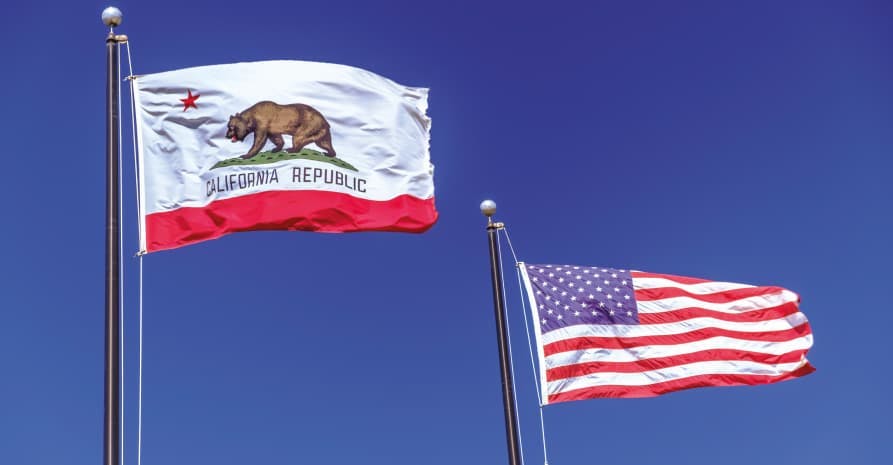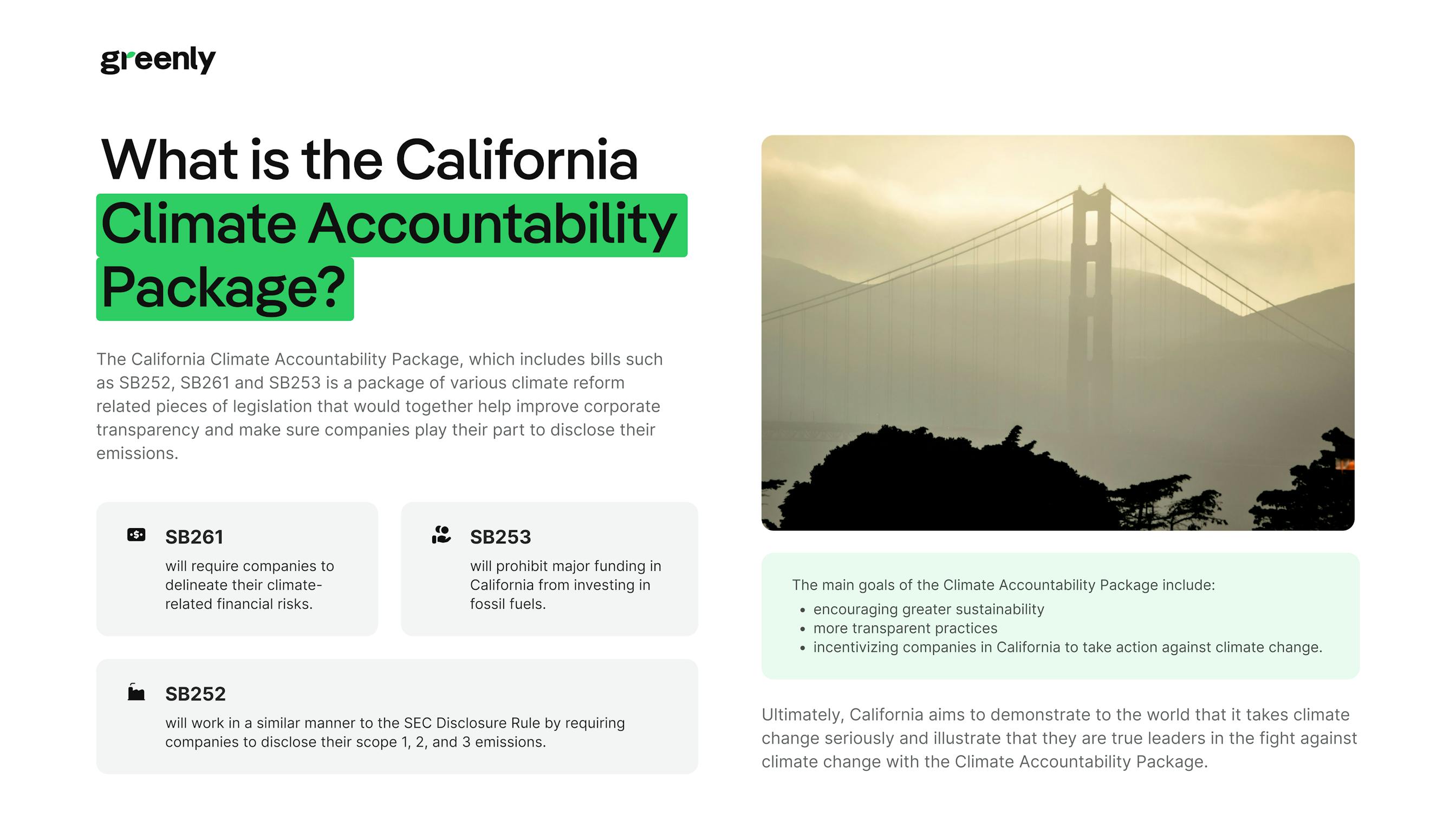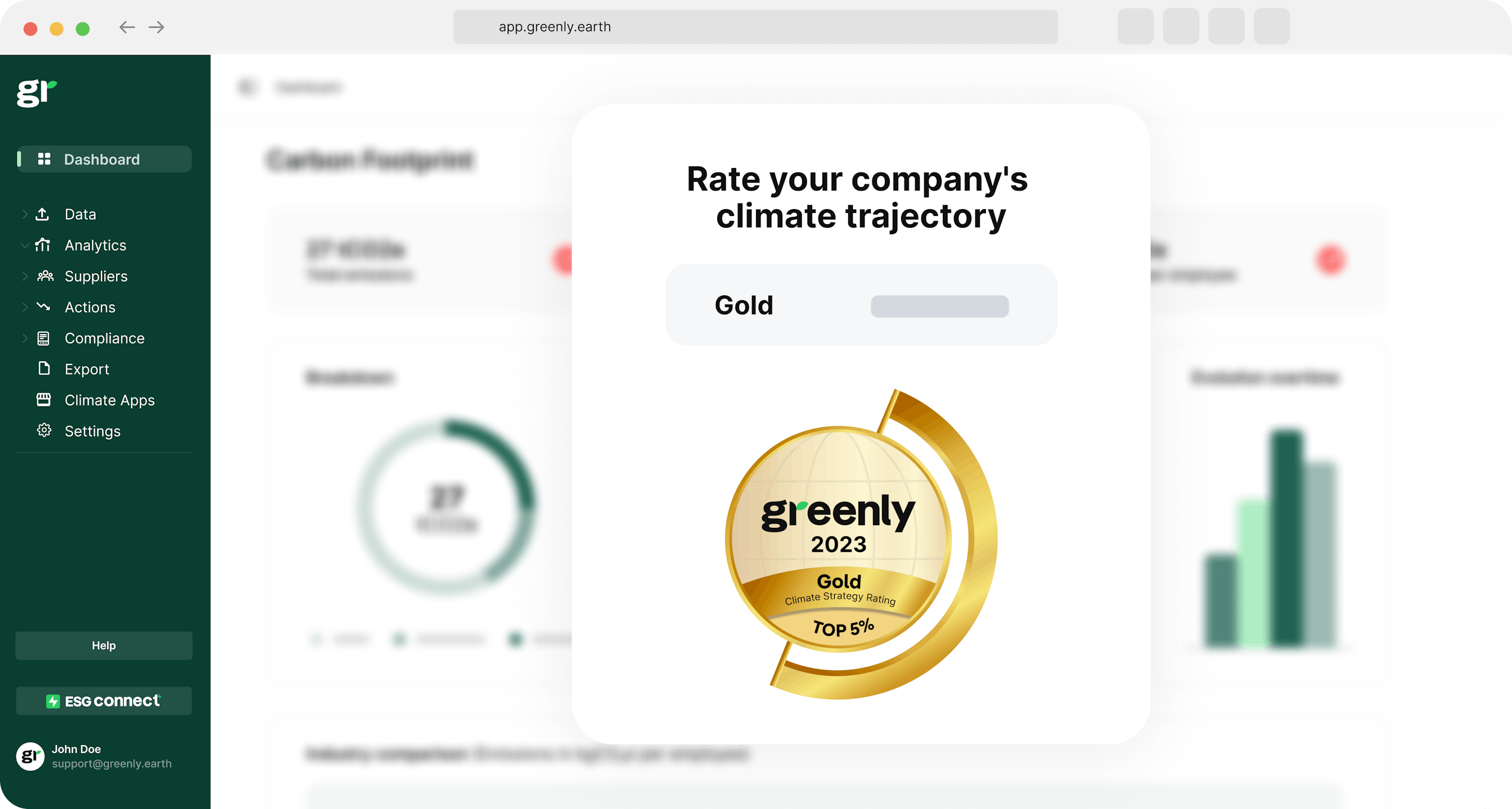
Impacts, Risks, and Opportunities (IRO) for CSRD Reporting
In this article, we’ll break down what IROs are, how to identify and assess them, and what CSRD requires in terms of disclosure.
ESG / CSR
Industries



California has been known for leading climate change movements not only across the country, but around the world – and as the state of California is home to one of the largest economies on the globe, much attention has been brought upon California’s Climate Accountability that is currently under review by the State Assembly.
Addressing climate risk via a reporting entity such as Senate Bill 253, now SB 219, can help ensure California and the global economy keep greenhouse gas emissions at bay to help address climate risk, improve climate related financial disclosures, and protect financial markets.
Climate related financial disclosures can help to reduce statewide greenhouse gas emissions, reduce climate risks, address a company's health and safety code, and encourage other businesses to reduce greenhouse gases.
What is the California Climate Accountability Package, and how do senate bills such as SB 253, SB 261 (now known as SB 219), and SB 252 help the state work towards their climate goals, reduce emissions, and ensure sustainable and transparent business practices are employed?

The California Climate Accountability Act, also referred to as the California Climate Accountability Package, is a group of bills that consists of three different but correlated bills: SB 253 & SB 261 (now SB 219), and SB 252 – all of which work together to help improve corporate transparency, reduce climate risk, and ensure companies do their part to disclose their emissions with the public.
SB 219 is the final bill which contains the original rules depicted in bills SB 253 and SB 261.
This is in addition to other protocols such as the California Air Resources Board (CARB), nonprofit climate reporting organisation, the state air resources board, the California Consumer Price Index to address climate-related financial risks, and administrative hearings conducted pursuant to ensure people who don't abide by these senate bills will seek administrative penalties.
These bills in the California Climate Accountability Package will help to encourage businesses to take action and address climate change, as if the bills are to be passed – it would require thousands of businesses in California to report the scope 1, scope 2, and scope 3 emissions in addition to their climate-related financial risks.
Originally, these requirements were supposed come into play as early as December 2022, further illustrating the state’s commitment to climate reform. However, the bills have repeatedly been delayed – as the state struggles to come to an agreement.
In fact, it is important to note that as of 2024 – Governor Newsom has implemented a potential 2 year delay to implement these laws out of fear that some companies may not be prepared to face the upcoming administrative penalties imposed or to withstand climate related risks or climate risk disclosure as a result of inadequate or insufficient reports.
This being said, Newsom did sign SB 219 into law on September 27th, 2024 – which will ensure strict deadlines for the original SB 253 and SB 261 bill and officially merge the two bills into one comprehensive regulation.
According to senators in the state of California, the bills part of the Climate Accountability Package are meant to encourage sustainable and transparent practices such as ESG investing and disclosing climate-related risks.
As the SEC Disclosure rule continues to be delayed, California is determined to move forward with the bills part of the Climate Accountability Package – seeing as an alarming amount of emissions created by a state can be a result of the businesses activities alone.
In fact, the California Climate Accountability Package has been compared to the SEC climate disclosure rule – claiming to be giving the now well-known SEC disclosure rule a run for its money. Therefore, the goals of the Climate Accountability Package can be compared to other disclosure rules such as the pending SEC disclosure rule in the U.S. and the Corporate Sustainability Reporting Directive (or CSRD) in Europe.

The various bills part of the California Climate Accountability Package would work to ensure transparency and greater accountability on behalf of businesses by requiring businesses across the state of California to disclose greenhouse gases, business operations, and activities.
Examples include needing to disclose their greenhouse gas emissions, climate related financial risk, and adhere to comprehensive risk disclosure requirements.
Ultimately, each bill in the Climate Accountability Package would focus on a different facet to work towards these goals for stronger climate accountability.
The California Climate Corporate Data Accountability Act (CCDAA) will require certain U.S. based public and private companies operating in the state of California to disclose their scope 1, 2, and 3 emissions starting in 2026.
In 2026, companies will only need to share the scope 1 and scope 2 emissions data – with scope 3 emissions reporting not being required until 2027 (where companies will be subject to share their emissions data starting from 2026).
Hare are some additional requirements and rules to know for companies required to comply with the California Climate Corporate Data Accountability Act:
Remember, the TCFD provides guidance for companies looking to address their current climate risk. At Greenly, we can already offer help with climate disclosures such as with the CSRD – and we plan to help clients adhere to protocols such as the California Climate Corporate Data Accountability Act in the future.
Known as the most revolutionary and ambitious bill in the package, Senate Bill 253 would require various public and private companies in California to disclose their scope 1, 2, and 3 emissions.
Companies keeping track of their emissions is essential to fighting against climate change, as it's hard to fix a problem when you don’t know the root cause of it. Companies that opt to recruit the use of a carbon accounting company like Greenly can gain better insight into where their emissions are coming from and how to better reduce them.
In case you forgot, here’s a breakdown of each emission category, or the various “scopes” that both public and private companies with revenues greater than $1 billion USD will be required to report under SB 253 (now SB 219):
Scope 1 emissions refer to direct emissions from owned or controlled sources.
Scope 2 emissions refer to indirect emissions from generating purchased energy.
Scope 3 emissions refer to all other indirect emissions that don’t fall under scope emissions 1 or 2, such as business travel, leased assets, or employee commuting. This requirement would not become mandatory under SB 253 (now SB 219) until 2026 or 2027.
SB 253 would allow a company’s entire supply chain to be monitored as companies required to report under SB 253 (now SB 219) will need to report ALL their greenhouse gas emissions.
All the emissions to be disclosed under SB 219 will need to be verified by CARB, or the California State Air Resources Board – where all emissions data will also be made available on a public digital registry. This helps promote transparency, another primary goal of the California Climate Accountability Package.
SB 261, now SB 219, also deemed as the Climate-Related Financial Risk Act, will require all businesses in California to share their climate related-financial risks. SB 261 was inspired by the climate disclosure rules demonstrated by CALSTRS, or the California State Teachers Retirement System, and other major financial institutions that focus on the financial risks associated with climate change.
SB 261, now SB 219, would work in alignment with the values depicted in the Task Force on Climate-Related Financial Disclosure, or the TCFD. The demands required on behalf of SB 261 (SB 219) would be compulsory by December 2024.
If passed, the Climate-Related Financial Risk Act (SB 261) would call for all companies doing business in California that have an annual revenue of $500 million or more to draft and submit a climate-related financial report in addition to their mitigation strategies.
In addition to submitting these climate-related reports, some companies would also need to publicly share their reports on their websites to adhere to the transparent values and goals of the California Climate Accountability Package. Various insurance companies or other businesses that may be overseen by the California Department of Insurance would be excluded from this requirement.
Ultimately, Senate Bill 261 (or SB 219) will help to protect consumers from losing money if the cooperation they are associated with does not take climate-related risks into account.
The last bill in the California Climate Accountability Package will make use of California’s public investment funds: such as the California Public Employees’ Retirement System (or CalPERS) and the California State Teachers’ Retirement System (or CalSTRS) in order to encourage business to fight against climate change while also safeguarding these imperative funds from the effects of engaging with the use of fossil fuels.
SB 252 will do this by forbidding the California Public Employees Retirement System (CalPERS) or the California State Teachers Retirement System (CalSTRS) from making investments in over 200 different carbon-intensive companies by divesting their shareholdings by 2031.
Previously presented as SB 1173, SB 252 has higher hopes to be passed alongside the rest of the bills in the Climate Accountability Package.
Ultimately, SB 252 will raise awareness to make use of climate-friendly investments, with the end goal hopefully being to influence how future investments are made. Those in support of Senate Bill 252 hope that SB 252 will finally put any doubts to rest regarding California's commitment to leading the movement against climate change.
Each bill in the California Climate Accountability Package is different, but they all support one another as the bills in the Climate Accountability Package each create opportunities to pursue individual efforts that could help to fight against climate change.
Here's a breakdown of how the bills in the California Climate Accountability Package are related to one another:
SB 253 and SB 261, now collectively known as SB 219, could indirectly help companies required to report under SB 253, as more finances will become available to them to implement more expensive tools to fight against climate change – such as with a carbon capture and storage system.
As of October 2023, both SB 261 and SB 253 have been signed into law – with the Governor of California, Gavin Newsom, having officially signed the California Cooperate Data Accountability Act (SB 253).
When co-working together, SB 219 and SB 252 develop a powerful and tangible plan that will elicit necessary action from these companies contributing to California’s carbon footprint. Each bill individually succeeds at something climate related, but together – the standard for fighting against climate change is higher than ever before.
| Bill | Full Name | Main Focus | Requirements | Implementation Date |
|---|---|---|---|---|
| SB 253 | Climate Corporate Data Accountability Act | Emissions Disclosure | Requires companies to report Scope 1, 2, and 3 emissions | Mandatory reporting by 2026 or 2027 |
| SB 261 | Climate-Related Financial Risk Act | Financial Risk Disclosure | Requires companies with annual revenues of $500 million or more to submit climate-related financial reports | Mandatory by December 2024 |
| SB 252 | Public Investment Funds Climate Act | Divestment from Fossil Fuels | Prohibits CalPERS and CalSTRS from investing in over 200 carbon-intensive companies | Divestment by 2031 |



Previously, there was no hard deadline in the works for when the California Climate Accountability Package was going to be officially passed – as it is difficult to determine the likelihood of any kind of climate legislation to be passed.
On the upside, optimism may seemed to have helped in for SB 253 (now SB 219) – as a bill with striking similarities to SB 253 was almost passed last year before falling short at the Assembly, and SB 253 was officially passed in October 2023. In addition to this, SB 261 (now SB 219) was also passed this past fall and SB 252 was passed in May 2023.
Therefore, the good news is that the more support the bills in the Climate Accountability Package, (similar to the logic of supply and demand) the more likely future bills are to passed.
However, not everyone may be in favor of passing climate bills like SB 253, SB 261, or SB 252 – such as residents or business owners in California themselves. This is because while the California Climate Accountability Package would be a massive stepping stone in disclosing emissions and encouraging more climate-change friendly behavior amongst businesses across the state, the bills could also result in higher costs in order for businesses to comply with the new bills.
Seeing as all of the bills are passed now, only time will tell how SB 219 will impact local businesses.

The best thing that companies in California can do as they await news of the bill’s passing is to develop an action plan to disclose their data today.
It is already important to calculate and understand your carbon footprint or climate-related financial risks, but the Climate Accountability Package (if passed) is likely to accelerate this movement at an unprecedented pace.
It’s smart to get started on adhering to these upcoming requirements today, and Greenly can help you comply with the bills in the California Climate Accountability Package and more.
At Greenly, we know that juggling the various requirements depicted in the California Climate Accountability Package can be overwhelming – which is why we've utilised EcoPilot AI to automate relevant data into precise categories for Scope 1, 2, and 3 emissions. Ultimately, this helps to streamline the overall process of adhering to these senate bills.
Ecopilot is an AI software company which can be used with an already-existing automated system, such as our own software for carbon accounting and sustainability tracking at Greenly.
As businesses across the state of California face sweeping demands to gather, verify and publish detailed disclosures of greenhouse gas (GHG) emissions and climate-related financial risk –employing the use of EcoPilot from Greenly can help your company to remain aligned with the California Air Resources Board’s expected disclosure frameworks.
With this new AI tool embedded into our existing software, EcoPilot can help organisations mitigate the challenges associated with tracking complex value-chain emissions, potential climate-risks associated with SB 261, and ensure ISO-style auditability required under SB 253.
Here’s how EcoPilot supports each component of California’s climate legislation:
As a whole, our AI-enabled features will allow anyone required to report under the Climate Corporate Data Accountability Act to benefit from a more efficient process to help support both transparency and strategic decarbonisation.
If reading this article about the California Climate Accountability Package, including SB 253 & SB 261 (now SB 219) and SB 252 has made you interested in reducing your carbon emissions to further fight against climate change – Greenly can help you!
Keeping track of all the current climate bills and future legislation to come can be challenging, but don’t worry – Greenly is here to help. Click here to schedule a demo to see how Greenly can help you comply with all of the upcoming regulations relevant to your company.
Greenly can help you make an environmental change for the better, starting with a carbon footprint assessment to know how much carbon emissions your company produces.
Click here to learn more about Greenly and how we can help you reduce your carbon footprint.
